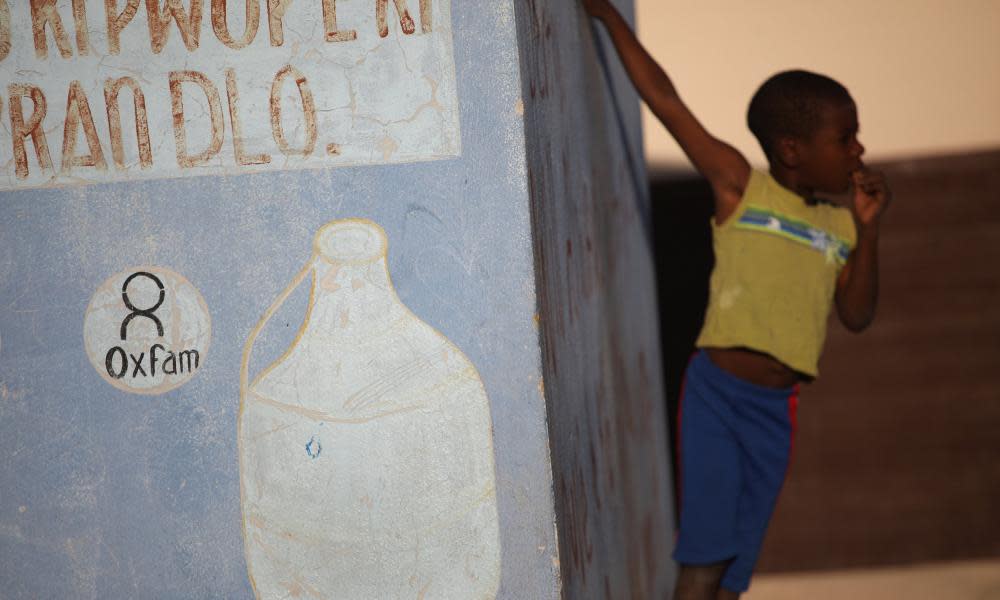Oxfam government funding cut off after Haiti scandal

Oxfam has agreed to withdraw from bidding for government funding until the Department for International Development is satisfied that it can meet the “high standards” expected.
In a statement, the international development secretary, Penny Mordaunt, said she had made a set of demands in light of the sexual exploitation scandal in Haiti and had received a formal response from Oxfam agreeing to them. She said that the government “reserves the right to take whatever decisions about present or future funding to Oxfam, and any other organisation, that we deem necessary”.
The news comes as the head of Oxfam International, Winnie Byanyima, announced a wide-ranging reform plan – including an independent commission to review Oxfam’s culture and practices – and warned that what happened in Haiti “is a stain on Oxfam that will shame us for years”.
The charity, which received £31.7m in taxpayer funding in 2016/17, also announced that it would publish a 2011 internal investigation into staff involved in sexual and other misconduct in Haiti as soon as possible.
What happened in Haiti?
Oxfam has been accused of covering up an inquiry into whether its staff used sex workers in Haiti during a 2011 post-earthquake relief effort. It is alleged those who were paid by the aid workers may have been underage. An investigation by the Times found that Oxfam allowed three men to resign and sacked four others for gross misconduct after an inquiry into sexual exploitation, the downloading of pornography, bullying and intimidation.
How much money could Oxfam lose?
The government has threatened to cut funds to Oxfam unless it shows “moral leadership”. In 2016-17, Oxfam’s income was £408.6m, according to its annual report, including £31.7m from the DfID. Aidan Warner of the National Council for Voluntary Organisations said: “They will be concerned not just about the money but the endorsement that the relationship with DfID represents, and they are clearly working hard to regain the confidence of the government as well as the public.”
How much does the DfID give to NGOs?
Last year the UK government dedicated £13.3bn to international aid. About £1.2bn of UK aid is spent annually through NGOs. In 2016, the UK was one of only six countries to spend 0.7% of gross national income on aid, a target set by the UN for all developed countries. Penny Mordaunt, the international development secretary, has said the UK remains committed to this target, despite some Tory MPs calling for it to be dropped.
Should other NGOs be worried?
A number have now been implicated. Some of the employees involved in the Haiti case went on to work for other NGOs. Over the weekend, the Sunday Times also reported that more than 120 workers from Britain’s leading charities have been accused of sexual abuse in the past year. Save the Children, which in 2016 secured multi-year contracts worth £91m with the government, had 31 cases, 10 of which were referred to the police. The British Red Cross, which admitted a “small number of cases of harassment reported in the UK”, received £16.3m in DfID funding.
In the statement sent out on Friday afternoon, Mordaunt said she had demanded that Oxfam make clear how it would handle any forthcoming allegations around safeguarding, whether they be historic or live, that they report staff members involved in incidents to their respective national governments, and that they fully cooperate with the Haitian authorities, including handing over all evidence they hold. She said that Oxfam had confirmed that it had complied with all these points.
She added: “Following our discussions, Oxfam has agreed to withdraw from bidding for any new UK government funding until DfID is satisfied that they can meet the high standards we expect of our partners.
“My priority is to deliver for the world’s poorest and most vulnerable, while keeping people safe from harm. We want to ensure that programmes we are already financially committed to are being delivered appropriately by Oxfam or any other DfID partner.”
She said she was aware there were hundreds of “good, brave and compassionate” people working for Oxfam around the world who had also been poorly served by Oxfam’s leadership team. She added that Oxfam had a long way to go to regain the trust of the British public.
In an interview with the Guardian, Mark Goldring, the chief executive of Oxfam GB, claimed criticism of the charity was “out of proportion to the level of culpability” and that critics were “gunning” for them while suggesting that no one had “murdered babies in their cots”. He said that the revelations could have a “substantial effect on public confidence, which would affect public donations”.
More than 1,000 direct debits to the charity were cancelled over the weekend and several high-profile ambassadors, including Minnie Driver, withdrew their support for the charity.
Not everyone has disowned the charity, however. Glastonbury organiser Emily Eavis echoed her father’s comments earlier in the week and said the festival would stand by the organisation “for many more years to come”.
“So we would like to pledge our continued support for Oxfam and the brave and vital work which it undertakes,” she said. “Oxfam do outstanding work all over the world and we firmly believe that the good does still far outweigh the appalling behaviour of the few whose actions have caused such harm.”

 Yahoo News
Yahoo News 
